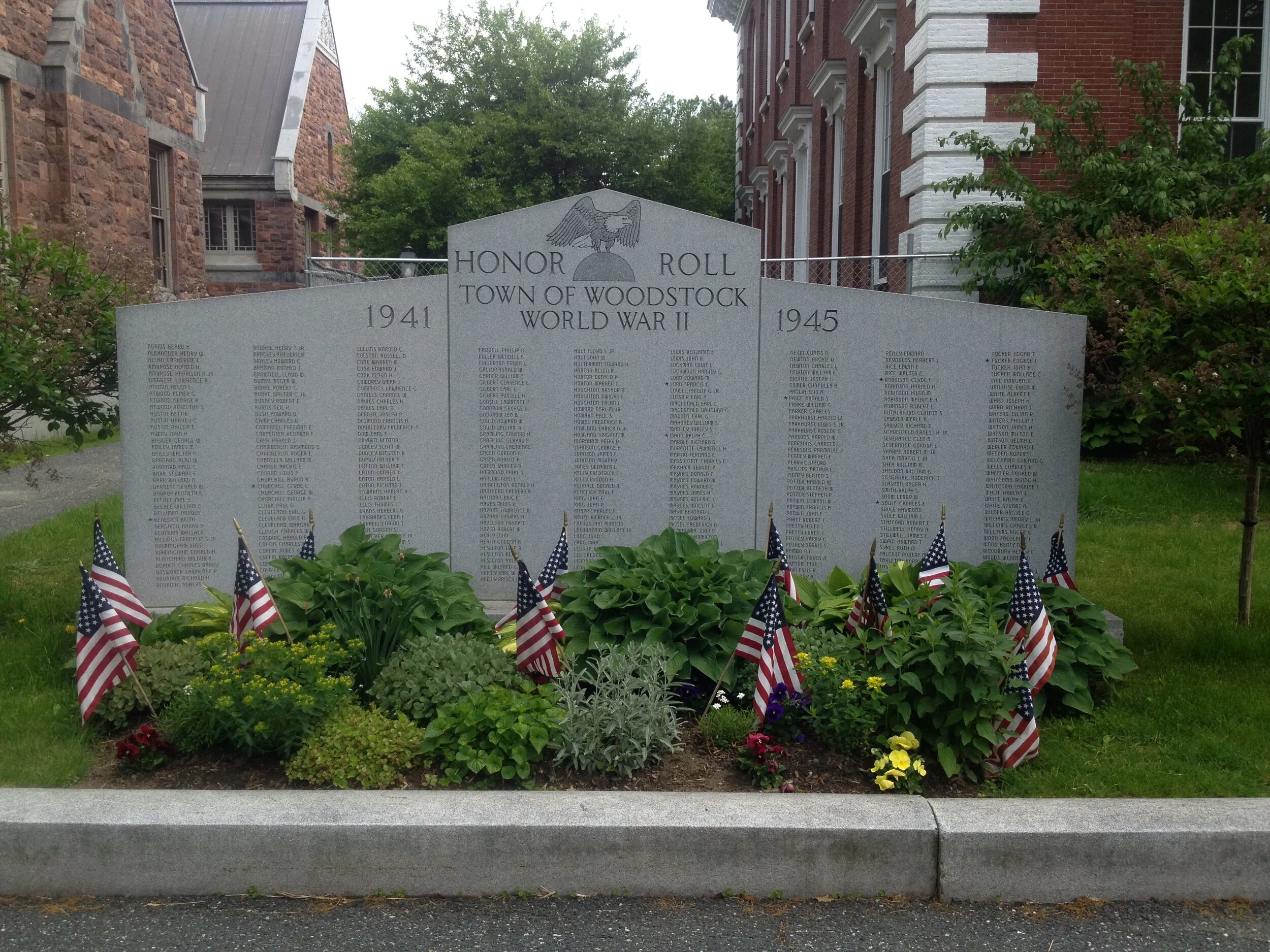Over the years, the Woodstock History Center’s Oral History Committee has interviewed many veterans. As a way of honoring them this year for Veterans Day, we are featuring excerpts from oral histories of Donald Wheeler, Elbridge Webster, and Gordon Fish.
Donald Wheeler
Don Wheeler was drafted and served in the US Army from February 1941 until November 1945. He served in the States until January 1943, and then he was sent to North Africa and Europe. After the war, he returned to the Woodstock area, where he raised a family with his wife, Velma.
In his interview, Mr. Wheeler describes a close encounter with enemy fire during the War:
“We were moving and mostly in the field … always in tents… Then when we got to Italy, … a commanding officer made a reconnaissance by Piper Cub, and he moved us … [to] this beautiful spot beside Lake Bolsena in Italy. He thought that would be a wonderful place for us. So going in one afternoon by truck … we came to a point in the road where we had to make a left turn. But as we approached, we noticed all of these men and mortars and all laying in the field. We thought this doesn’t look good, you know. Anyway, we went in to our site that afternoon. Come to find out, we were ten miles ahead of our own infantry. We spent all afternoon digging our foxholes… The enemy was on the other side of the lake, and they watched us all afternoon setting up camp and everything… We didn’t know it then. Then somebody found out that evening, and they came around about 8 o’clock or so and said, “Be very quiet, but we are moving out of here now. Pick up everything.” We had an Irishman from Somerville, Massachusetts. He was very nervous, always was. He was a tall, lanky fellow, and he was running around slashing tent ropes with his bayonet and everything and threw everything in the truck. They said an hour or so after we left, they [the Germans] shelled the devil out of that place. They said the next morning it looked like a plowed field. If we had stayed, we’d all have been killed…”
Donald Wheeler
Elbridge Webster on a jeep
Elbridge Webster
Elbridge Webster was born in Pomfret, Vermont, and graduated from Woodstock High School in 1936. He was drafted when World War II broke out in Europe and later inducted into the 34th Field Artillery Battalion, 9th Infantry Division. Over a four-year period, he was stationed in both North Africa and Europe and received numerous medals for his outstanding service. After the War, he returned to Vermont where he worked as a farmer.
During the War, Mr. Webster delivered supplies to the troops. His assignments often put him in harm’s way. In his interview, he stated:
“We were preparing for the invasion of Normandy, driving trucks through ponds and waterproofing vehicles and getting ready for the invasion of Normandy… [To waterproof a vehicle] you have to cover all the electrical wiring and everything that’s vulnerable… You have to cover it all with asbestos and grease, grease that won’t catch fire. You have to put a snorkel onto the air cleaner and the exhaust… The [spark] plugs have to be all waterproofed, of course… You have to put … a piece of burlap over the radiator because when you go into a pond, the resistance is so heavy that water going through your radiator and the resistance of water will … stall your motor … As I remember, it rained all night, the 5th of June… Anyway, the invasion was on. They loaded us on the transport ships, and we set out there in the Channel, starting on the 6th… The Germans would come over and bomb us about every morning, just before it got light, and drop flares which lit it up as light as the lightest moonlight night. Then … we landed on Utah Beach four days after the initial invasion. They [the Allies] had a beachhead that was two miles deep and ten miles wide. They had these floating docks that are build up out of cubes of concrete and steel … with a motor on them. You could unload a good-sized vehicle … Mine was like an oversized pickup truck. It had big tires on it. It was a Dodge, and I had some officers on it with me. We had four sandbags on the floor, two on each side of the floorboards, so if you hit a mine, the splinters wouldn’t come up through and injure you. You had your windshield down and covered up. [The motorized docks] took you into the beach as close as they could, and then you drove right off into the water. The water was right up on the floorboards in the truck when you drove off. We drove out of the beach area, which was barren, except for fellows that had been killed or vehicles that had been knocked out by shell fire. Then, after we got across the beach and where they thought it was safe to stop for a while, we had to de-waterproof all of this, take all this grease off. So our mission was to… spearhead up to Cherbourg, France, which was the only fort and dock in that area where they could dock a big transport ship to unload supplies from.”
Gordon Fish
Gordon Fish grew up in the Woodstock area. He served in the US Marines from 1942 until 1945 in the South Pacific, including Wallis Island, the Gilbert Islands, and Okinawa, where he was attached to the 5th Marine Corps. After the War, he eventually moved back to Woodstock, where he got married and raised five children.
In his interview, Mr. Fish stated:
“I enlisted [in the Marines]… At that time … it seems all us young fellows wanted to get in an outfit that was going to be closest to the action in our minds… I was sent to New River, North Carolina… It was a Marine base for getting people in shape and they really got us in shape. I weighed 155 pounds when I went in, when I came out 7 weeks later, I weighed 190 and I could dog trot from here to Rutland and back… I got in there to train in radar. At that time it was the very start of radar, so I was trained in that for about two weeks…
Actually I liked it [basic training]. I liked it all. I could see that they were trying to get us into top physical shape and teach us to obey orders, and I felt that’s what we should have done…
[Upon completion of basic training], I went to a place called Wallis Island, which is down below British Samoa. It was, at that time, one of the furthest bases we had out towards Japan… We had an airport there and heard Tokyo Rose on the radio… She said, “You boys won’t be getting any sleep tonight.” She was right! They’d come over and strafe us. I don’t know how she got the word what battery we were, but they knew anyway… I was there for … about eight months, I think.
After being stationed on Wallis Island, Mr. Fish was sent with the 5th Marine Corps to Okinawa. Mr. Fish states:
We were aboard ship for thirty-one days… [In preparation for our landing], we practiced going over the side [of the ship] in landing nets… You’d get in a boat with a sixty-pound pack on your back, and then you’d have to dodge the waves and everything. It’s tough work, just doing that.
Then we finally arrived up in Okinawa… We shelled it for about four nights before we hit this beach... We had white, white shells... They’d float down and lighten the whole beach up. So then we went ashore, and when I went ashore I didn’t realize it, but another one from Woodstock was killed right on the same beach that we arrived on, Don Paige. He was a Navy man who … tended to the wounded. He was killed there… This was the worst beating the Marines ever got. There were three thousand of them that never made the beaches. It was terrible anyway…
[While on Okinawa] I had to go on a burial detail… We just dug a hole right there and just – they [the corpses of Japanese soldiers] were in such bad shape, I’d take a pick and hook it onto their ribs and drag them over to the hole and dump them in the hole. That’s the way it went over there. We had to do it because the pigs had all gone wild on the island and they were eating corpses... Pigs will do that, so we got word never to eat any more pigs, and we had to bury all the bodies we found…
Gordon Fish
This is some Japanese money I took off a body [along with a] letter from a guy. He was a soldier. He was probably writing his wife or something. So after I came back… I got this woman I was taking to Boston. I told her I had a letter from this Japanese guy [for] his wife. She said she’d like to take it because she was going to Japan and teach. But I never did get it to her in time. That would have been good, you know, maybe she could have found the person it belonged to.
I think I really grew up, and I think … it would do a young boy good to be in the military right now… [My time in the service] made me appreciate the country that we live in, and I might not have done that before so much as a young person. I sure do now.”
Japanese money that Mr. Fish brought back from the War





